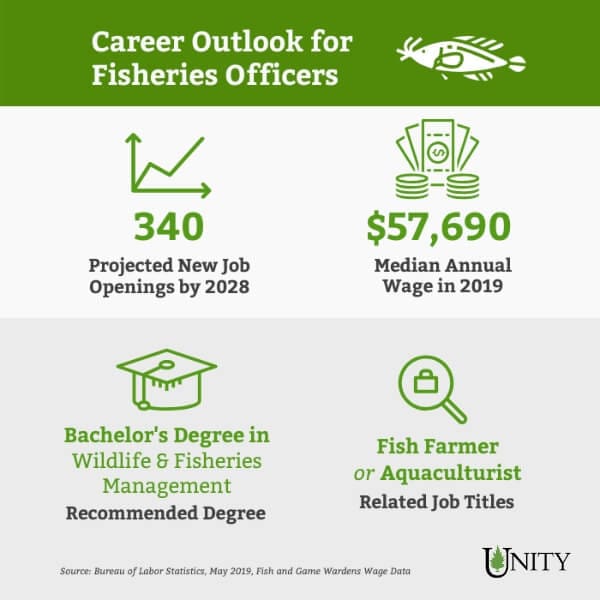
Fisheries officers breed, raise, and harvest fish in a facility or designated outdoor environment. A professional in this role ensures the operations run smoothly – by maintaining sustainable yields and monitoring natural resources. These workers play an important role in aquatic conservation.

Fishery careers have a positive impact on our environment. From providing food sources to protecting fish populations, there are many different types of jobs in this field. Each role serves a purpose in facility operations and aquatic conservation efforts. But, what exactly are the functions of each of these jobs? How much is a fish farmer’s salary compared to other similar roles? We’ve compiled these details into this guide on becoming a fisheries officer.
What Is a Fishery?
What does ‘fisheries’ mean, anyway?
Fishery Definition
A fishery is a facility where fish and other marine life are raised and harvested. Fisheries are typically used as a food source but are also used to restock ponds and lakes for recreational fishing. Typically, these facilities will manage the population of a specific type of fish such as cod or salmon.
Aquaculture Definition
Aquaculture is the practice of breeding and harvesting fish and shellfish. A method of artificial farming, aquaculture is an environmentally responsible source for food and other products such as fish oil. There are many types of career opportunities in aquaculture.
Fish Husbandry Definition
Fish husbandry is the raising of fish in controlled environments, such as enclosures, to be consumed as food. Fish husbandry is also referred to as fish farming. Common species found on these aquafarms include salmon, trout, and cod.
Careers in Fisheries Management
When asking “how to be a fisheries officer,” it’s important to understand that there are many different types of aquaculture careers. Which one is right for you? Is pay important? After all, a fisheries development officer’s salary may be different than a fisheries inspector salary, especially when first starting out.
In this section, we’ll take a closer look at the different types of management job titles.
Fisheries Officer Job Description
A fisheries officer manages the conservation of facility resources. They often oversee the activities and regulations that could impact endangered or at-risk species. The responsibilities of this officer can vary depending on the size of the fishing industry and recreational uses in their state or region. Some officers may find themselves working in a facility while others may work on patrol boats.
Fisheries officers don’t work a typical 9 to 5 shift. These officers may find themselves working irregular hours including weekends, nights, and holidays. They’ll work in any weather condition, rain or shine. Due to the nature of the job, it is essential that these professionals enjoy the outdoors. They must also have excellent communication skills, including conflict resolution.
Key duties include:
- Identify and monitor areas and issues impacting fish
- Assist in research programs
- Respond to emergencies such as oil spills
- Provide information for recreational fishing
Fisheries Development Officer
A fisheries development officer is responsible for researching and evaluating development opportunities and proposals. They must have excellent project planning skills as they oversee the implementation of facility development projects ranging from harvesting to marketing.
Fisheries Protection Officer
Fisheries protection officer jobs ensure that all marine laws are being followed within facilities and fishing boats. They conduct inspections, take samples, and write up reports summarizing details of their inspections. A protection officer in this environment will also prepare violation cases for prosecution and at times may need to act as a witness in court.
Fisheries Technician Job Description
Fisheries technicians must be analytically-minded. These workers study facility ecosystems and must diagnose problems and assist in finding solutions. A technician in this role must monitor the spread of invasive species, parasites, and pollution levels, working on the front lines of the problem. They also assist in managing fish populations, restocking lakes, rivers, and ponds.
These technicians spend much of their time out in the field or in a lab. They’ll take and analyze samples as they continue to monitor levels of pollutants or other toxins. Having a degree in a science-related field, such as biology is useful to effectively research, analyze, and record findings.
Key duties include:
- Restocking lakes and other bodies of water
- Identifying invasive species and determining treatments to protect the fish and water
- Accurately recording data from recreational and commercial fishers
- Taking and analyzing samples
Fisheries Manager Job Description
A fisheries manager must understand how to run a facility effectively. Fisheries managers oversee all activities within the facility including maintenance, caring for the fish, equipment, and administrative tasks. They must collaborate with members of their team as well as managers from other facilities to ensure smooth operations and to resolve any issues.
These managers may work in a designated area outside or within building managing tanks and operations. A career in fisheries management comes with many responsibilities and with that, many skills and traits are required to be successful.
They must have strong communication skills to manage and train facility employees. A manager must have a good eye for managing tanks, equipment, and understanding reports. A bachelor’s degree is typically necessary to become a fisheries manager.
Key duties include:
- Oversee fishery operations and equipment
- Administrative duties such as scheduling and record-keeping
- Work with other fishery managers
- Train new fishery employees
Fisheries Data Manager
A fisheries data manager must show the importance of their facility compared to its alternatives. With accurate reports, they should be able to present the positive impacts of fisheries. Data collection is dependent on receiving timely reports from fishermen. Data managers must have processes and other tools in place to ensure that data and reports are submitted on time.
Fisheries Biologist Job Description
A fisheries biologist works primarily to understand the health of fish populations and how and what is affecting it. They study individual fish species to understand how they’re impacted by environmental changes from issues such as pollution, changing ocean temperatures and oil spills. These biologists are often involved in conservation efforts and often help create the environments within aquafarms.
Biologists who work at these facilities have many different areas they make work. Some may head out onto the ocean by boat to study and map fish stocks. Others may work specifically in aquafarms, creating and maintaining environments for fish to be bred and raised.
Some biologists may opt for desk and lab research, gathering data like population trends and feeding habits. Though some office work is necessary, most biologists work outdoors and travel extensively to field sites.
Key duties include:
- Identify endangered species as well as those at risk of becoming endangered
- Take and analyze samples, recording findings
- Maintained detailed reports and databases shared with other biologists
- Research ecosystems to determine impacts caused by global change, pollution, and other causes.
How Much Does A Fisheries Officer Make?
The median annual salary in the U.S. according to May 2018 BLS data was $59,240. Those just starting out in the industry should expect lower salary estimates with the lowest reported as $40,090.
On the flipside, senior-level officers may expect to earn as much as $80,140 a year. The annual salary of a fisheries officer will vary depending on their work experience, location, job level, and education.
There are several similar roles in these facilities and the compensation for each may be close. For example, is the fisheries data manager salary similar to facility managers’? Yes, but as with any job, experience, location, and other variables can play a factor. It’s a similar scenario for other job incomes, such as the marine husbandry salary.
What Is the Job Demand for Fisheries Officers?
According to the BLS, there were approximately 19,300 fishery officer-related jobs in 2018. Most of these jobs are within state and local governments. Job demand is considered to be growing at an average pace, with an additional 900 jobs to be added by 2028.

Fisheries Education Requirements
How do you become a fisheries officer? What type of courses or degree programs should be considered?
A bachelor’s degree in aquaculture and fisheries management related studies and some industry experience will help you secure a fisheries career. Although a college degree may not be required for some entry-level roles, it can help place you in a higher-level role with a higher salary.
Aquaculture and Fisheries College Education
While researching how to become a fisheries officer, it’s important to consider the education that is required. The typical aquaculture manager education includes a four-year degree in a related program of studies. Course details for these types of programs include ecological and biological principles as well as management skills.
How long does it take to become a fisheries manager?
A bachelor of fisheries and aquaculture related studies is often required to become a fisheries manager. Once out of college, it’s common for an aspiring manager to work at a lower level such as an aquaculturist or other related job role to gain experience. In order to advance into a senior role, managers should have several years of industry experience.
Aquaculture and Fisheries Degrees
Consider the following Unity Environmental University degree programs to start your career…
B.S. in Marine Biology: This degree program will ready you for any aquatic career whether you work out at various job sites or within a facility. The program’s courses cover topics like oceanography, ecology, and habitats for sea life.
Additional Certifications and Licenses
Additional aquaculture qualifications may be required for some higher-level roles, such as those in research. While some jobs may not require a certification, it’s an important credential to list on your resume and can often show that you’re experienced and well-educated in the field.
- Associate Fisheries Professional (FP-A) – If you have successfully completed a bachelor’s program, but have no work experience, you can apply for an FP-A. This certification shows that you have met the requirements for the necessary coursework in fisheries.
- Certified Fisheries Professional (FP-C) – After completing a degree program and gaining work experience, you’ll be eligible to apply for the FP-C. An FP-C is valuable as it shows that you’re knowledgeable and can successfully perform the job responsibilities.
Ready to cast your net?
Now that you know the answer to questions like ‘What is a fishery?’, understand the different types of jobs available to fisheries workers, and have a firm grasp on aquaculture manager salary information, it’s time to consider taking the next steps.
Head on over to Unity Environmental University Career Services to see what’s in store for you to grow your career. Whether you’re looking to become a technician or a biologist, find out how one of our degree programs can kick start your career.
Curious about other environmental careers? Explore more aquatic jobs or splash around in our blog to discover even more environmental career paths and how to get started in each.



